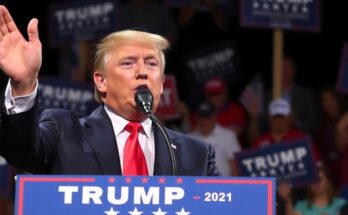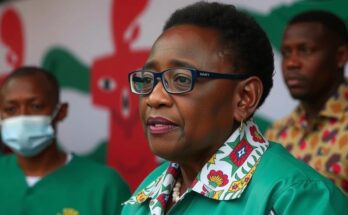Senegal’s ruling Pastef party claims a substantial victory in legislative elections, securing a mandate for reforms. Voting was peaceful, with early counts showing 90-95% support. President Faye, facing high inflation and unemployment, aims for economic transformation and social justice. The election follows a previous parliament’s opposition dominance, prompting calls for snap elections. Voter turnout was lower than anticipated, yet many express hope for change and governance continuity.
In a significant demonstration of political support, Senegal’s ruling Pastef party has announced its decisive victory in the recent legislative elections held on Sunday. This success affords the party a strong mandate to advance its reform initiatives, only eight months after assuming power. According to government officials, the voting process was peaceful with preliminary counts of 90 to 95 percent indicating that President Bassirou Diomaye Faye’s party emerged as the front-runner against its opposition. Government spokesman Amadou Moustapha Ndieck Sarre praised this achievement, stating, “I pay homage to the Senegalese people for the large victory that it has given to Pastef.” The electoral success is crucial for President Faye as he seeks to deliver on promises of economic reform, social equity, and anti-corruption measures that resonate with a largely young and discontented populace facing pressing challenges such as high inflation and unemployment. The need to regain legislative control became apparent following the opposition’s dominance in the previous parliament, which prompted President Faye to initiate snap elections. Voter sentiments indicated a desire for change, with individuals like Pascal Goudiaby expressing hope that this election victory would provide a legislative majority necessary for effective governance: “The priority is unemployment, young people are facing so much unemployment.” Moreover, Faye’s choice of political mentor Ousmane Sonko as prime minister aligns with their shared vision of a leftist pan-African agenda, aiming to liberate Senegal from foreign economic dependencies while enhancing national sovereignty. New voters, such as 20-year-old Mademba Ndiaye, recognized the crucial role of voting in shaping the future: “It’s one of the only ways we can really have an impact on society.” Historical voter behavior shows a tendency to affirm their presidential choice through parliamentary votes. In this light, many voters, including Toure Aby, stressed the importance of continued support for the president to fulfill his objectives. Despite the peaceful conduct of voting, concerns lingered regarding allegations of fraud from opposition groups, notably that led by former President Macky Sall, who claimed the election was marred by “massive fraud organised by Pastef.” The stakes of this election extend beyond party dynamics; unemployment rates exceed 20 percent, and many youth risk perilous journeys to Europe for financial relief. In response to burgeoning economic challenges, the new government has implemented reductions in the prices of essential goods and launched initiatives aimed at fiscal reform and development planning. As such, the path forward involves navigating a politically fragmented landscape while addressing pressing economic concerns. In summary, if successful in passing the legislative reforms, it could significantly reshape Senegal’s economic landscape, enduring tradition of democratic stability, and resurgent political spirit among its youth.
The political landscape in Senegal has evolved significantly since President Bassirou Diomaye Faye came to power. His party, Pastef, has emerged as a dominant force following the legislative elections, marking a shift towards a reform-oriented government. Amidst a pressing economic situation characterized by high unemployment and inflation, the government has positioned itself to tackle these issues through ambitious new policies. Historical patterns in Senegalese voting behavior suggest a close connection between parliamentary support and presidential mandates, indicating that the success of legislative elections is vital for the administration’s ability to implement its agenda.
The legislative elections in Senegal have culminated in a significant victory for the ruling Pastef party, affirming President Faye’s political authority to pursue reform initiatives aimed at economic and social improvement. Though the path forward includes addressing formidable opposition challenges and widespread economic distress, the government’s electoral mandate is a critical step toward achieving transformative goals. Voter sentiments reflect both hope and urgency for tangible improvements in living conditions.
Original Source: www.france24.com




